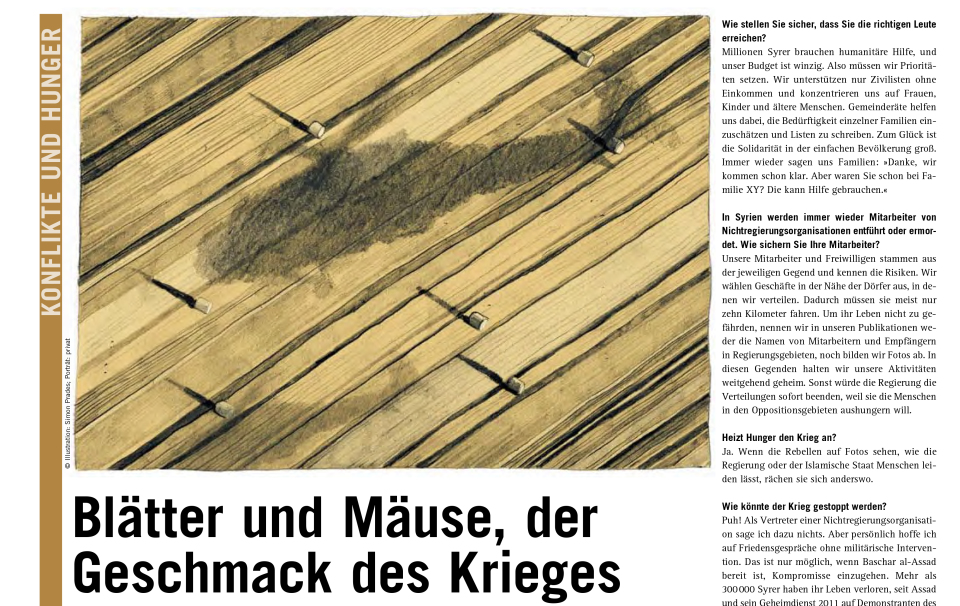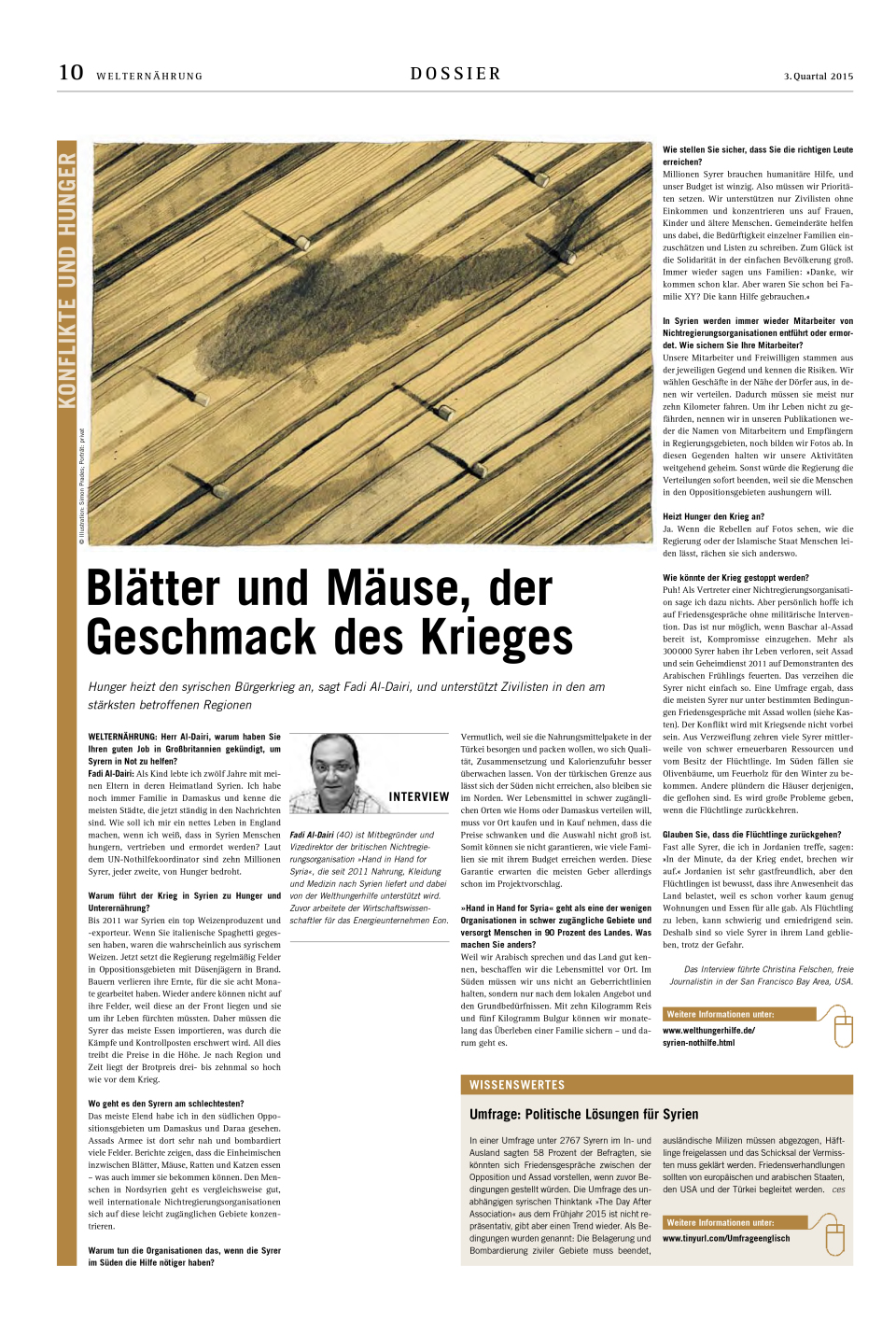Fadi Al-Dairi, 40, is co-founder and deputy chair of the British NGO Hand in Hand for Syria, that delivers food, clothing, medicine and other aid into Syria since 2011 and is being supported by Welthungerhilfe. Before that, the economist worked at the energy firm Eon.
Mr. Al-Dairi, why did you give up your good job in Britain to help Syrians in need?
As a child, I spent twelve years in Syria with my parents, who were born there. Many of my family members still live in the Damascus area and I know most of the cities that are constantly in the news now. How could I live an easy life in England, when I know people are suffering there? According to OCHA, ten million Syrians, one in two, can no longer access sufficient food to meet their basic needs. That was in late 2013; two years down the road, this number is probably even higher now.
Why does the war in Syria lead to starvation and malnutrition?
Syria used to be a prime wheat producing country. Italy makes most of their spaghetti with Syrian wheat. A recent attack by government jet fighters caused the fields to catch fire and farmers lost their crops that they worked hard to grow for over eight months. These attacks happen on a regular basis; they are meant to weaken the opposition. Other fields were caught up in the fighting whilst again in other areas farmers are unable to go out to the field in fear for their lives. Thus Syrians have to import most of the food, which is difficult because of the fighting and checkpoints. All this drives prices up. Depending on your region and the time, the price for bread has increased three- to ten-fold during the war.
Where is starvation worst?
The opposition controlled areas around Damascus and Daraa in the South seem to have the hardest time. Assad’s army is close and often shells their fields. Reports show that those people started eating leaves, mice, rats and cats – anything they can get their hands on. We are among the few NGOs who access this region. Second worst off are the civilians in government controlled areas like Damascus, as they have to pay an ever higher amount for their fresh produce, which they buy from the opposition-held countryside. In contrast, people in the north of Syria are rather lucky, as international NGOs tend to focus on these easier-to-access areas.
Why do they do that, although Syrians in the South are in dire need?
I think this is, because they want to procure the food from Turkey, which makes monitoring and quality control of the goods easier. And you cannot reach the southern provinces with an aid truck from the Turkish border. If you want to reach places like Homs or Damascus, you have to procure locally, while accepting a limited variety of goods and fluctuating prices. That means you cannot guarantee how many families your budget can serve at a given moment, while most donors expect such a guarantee in the project proposal.
Your NGO “Hand in Hand for Syria” operates in 90 percent of the country, including severely-hit and hard-to-reach areas. What do you do differently?
As we speak Arabic and know the country well, we buy the food locally, taking price fluctuations and a limited variety into account. However, in the North we have to stick to donor guidelines; that means we have to buy from Turkey, where the donor monitors the quality, the amount of calories and the variety of our food baskets. We would prefer to buy from the same supplier inside Syria to empower local workers, but the donor wouldn’t accept a video of the packing for their supervision. I feel that the guidelines are often out of line with the actual needs of Syrians. We often hear: “20 different varieties? Tuna and cheese spread? Thanks! But it would have been great to reduce the variety and increase the quantity”. In the South, we are more flexible and we cater for the basic needs of the people, handing out 10 kg of rice and 5 kg of bulgur for example.
How do you ensure the safety of your workers on the ground – given the abductions and killing of NGO workers in Syria?
We never had any problems. All our staff and volunteers are local from the areas we work in, they are known to the community and are familiar and fully aware of the risks behind their decisions. We keep the distances between the shops and the distributions as short as possible – often at less than 10 km. In our publications we hide the faces and names of our co-workers and beneficiaries living in government controlled areas, so we don’t put their lives in danger. In these areas we keep quiet about our activities and do not reveal where we buy the food, as the government would cut the supply from these corner shops, because they try to starve the people in the opposition held areas.
How do you make sure that your food distributions reach the right people?
Millions of Syrians lack food and humanitarian aid. Our budget is tiny in comparison. So we have to prioritize. We only support civilians without any income and focus on women, children and elderly people. We assess families’ needs with the help of local councils who write lists for us. Fortunately Syrians tend to show solidarity: Often families say that they are fine and point us in the direction of someone who is in dire need.
Does hunger fuel the conflict in Syria?
Yes, when the opposition forces see photos of how the government or ISIS are letting people suffer or starve – like in Yarmouk Camp in Damascus – they want to take revenge somewhere else. At the same time, the opposition makes sure that civilians in their areas receive enough food, so that they will continue to approve of their resistance to the Assad regime.
How could the war be stopped?
Oh my! As NGO we have to be neutral, but as a British citizen with a Syrian background I clearly prefer peace talks to a military intervention. However, an agreement will only be possible if Bashar al-Assad’s government is willing to compromise. More than 300,000 Syrians lost their lives since Assad and his intelligence service started targeting Arab Spring protesters in 2011. People are not going to forgive easily. A survey recently found that the majority of Syrians only want peace talks, if they can impose certain conditions to the Assad regime (see box).
The conflict won’t be over when the war is over. Syrians are so desperate to fulfil their basic needs that they already live off possessions of those who left and precious natural resources. In the South people started cutting 70-year-old olive trees to provide firewood for the next icy winter. It will take decades until olives will grow again. And some Syrians ransack houses of those who fled the country, selling doors, windows and tiles to make a living. This will cause big problems as soon as the refugees return.
Do you think most Syrians will return home?
The Syrians I meet in Jordan nearly all tell me: “The minute the war stops, we are going home.” Jordan is very welcoming, but refugees feel that they put a strain on local communities that already had insufficient resources, especially in housing and nutrition. Living as a refugee can be difficult and humiliating – that is why so many Syrians stay in their country despite the danger.
Remark: We did the phone interview in mid-August, thus before the start of the Russian military intervention.
Survey about political solution for Syria
In a survey among 2,767 Syrians inside and outside of Syria in early 2015, 58 percent of the respondents said that they could imagine peace talks between the opposition and Assad, if preconditions were imposed beforehand. Only 6.5 percent of the respondents think that the regime should impose these conditions. The survey conducted by The Day After Association, an independent Syrian-led think tank, indicated a trend without being representative. Nearly all respondents supported the following conditions: ending the siege on civilian areas, releasing political detainees, revealing the fate of the missing, ceasing the bombardment of civilian areas, and the withdrawal of foreign militias. Nearly all respondents said that negotiations should be monitored by European and Arab states, the US and Turkey. They were less enthusiastic as to the participation of Russia and Iran.

